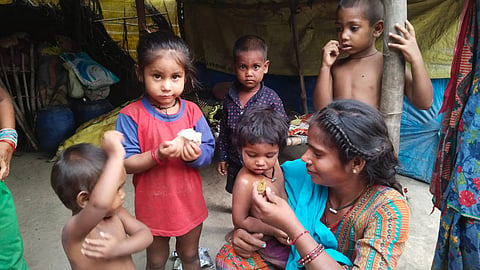
In Uttar Pradesh, tribals are still looking for employment opportunities even after 75 years of independence. When they do not get work, they work as petty vendors selling balloons, toys and cosmetics door-to-door.
When they fail even in this, they are forced to beg. According to the 2011 census, the total number of tribes in Uttar Pradesh is 11,34,273. While Article 342 of the Constitution contains information about tribes, there are a total of 12 tribes in Uttar Pradesh. The oldest of these tribes are Tharu and Buxa. The highest number of tribes is in Sonbhadra district, and the lowest tribe is in Baghpat. Apart from this, people of tribal communities also live in other districts like Azamgarh, Mau, Sitapur, Lakhimpur, and Hardoi. The Mooknayak team reached ground zero in Hardoi, adjacent to Lucknow, to assess their living conditions.
"I work as a petty vendor," Ramesh said. He added, "Some time ago, we came to live in Deh. Earlier, we have been camping near Killaharan. And before that, we used to live near Bhaiyan village. We've changed places more than a hundred times."
Sharing his pain, Ramesh says, "The biggest problem is changing the place. When we leave for work, there is fear in our minds that when we reach home, our house may be destroyed. Sometimes we are chased away. The problem of employment is too much. To feed the children, I sell bindi, lali, lipstick, etc. In this, two to three hundred rupees are earned. But with inflation, this expenditure is also less."
"I have never been to school since childhood, nor have my parents. Due to constantly changing places, I am not able to teach my children either. My children also prefer to work as hawkers like me instead of reading. This only increases some of the family's income," Ramesh told The Mooknayak representative.
Salman and Ragini, who live in the basti, were contacted by The Mooknayak representative. Salman got married six years ago. Now Salman has the responsibility of two daughters. Salman sells balloons, while his wife collects rations by begging. Salman explains his pain and says, "There is a big problem of employment. It is difficult to find a stable job. I sell balloons to feed my family, but balloons don't make much money. Whatever is left is spent on the care and medicines of the children. We don't have any savings."
"I also have a government-made labor card, but it doesn't provide employment. When it was being made, it was expected that life would be better, but we only got work for a few days and then not. Many times the work was not paid. We didn't even think much about some money. Who should complain to the police? Even the police do not listen to us poor."
Speaking to The Mooknayak, Salman's wife says, "We have an Aadhaar card. There is a ration card, but only my name is in it. Only five kilos of ration are available. I have to beg to feed my two daughters. My family and I eat whatever we get."
According to government data, there are 1,028,737,436 Scheduled Tribes and Scheduled Castes in the country. Of this population, 8.2 per cent belongs to scheduled castes. The Scheduled Tribe community lives in the northeastern states of Mizoram, Meghalaya, and Nagaland, and Lakshadweep Islands.
Before the division of Uttarakhand and Uttar Pradesh, the tribal population was relatively small in the combined state. However, following the state's division, Uttarakhand emerged with a significant population of Scheduled Tribes (STs). The separation led to a concentration of tribal communities in Uttarakhand, highlighting the impact of administrative reorganization on tribal demographics in the region.
According to the data, 107963 Scheduled Tribes remain in Uttar Pradesh, which is only 0.1% of the state's population there. However, it is interesting that in 2002, the then government had announced some new Scheduled Tribes. According to the 2011 census, the total number of tribes in Uttar Pradesh is 11,34,273. Tribes are mentioned in Article 342 of the Constitution. The largest population belongs to the Tharu tribe. There are a total of 12 tribes in Uttar Pradesh. The oldest tribes are Tharu and Buxa.
The Tharu tribe lives in the Terai part of Gorakhpur in Uttar Pradesh. The people of the Tharu tribe belong to the Kirat dynasty. A festival called Bajhar is celebrated by the Tharu people. They celebrate Diwali as a mourning festival, 'Khichdi' dance is performed by the Tharu tribe on the occasion of Holi. The Tharu tribe has a different and unique marriage system. The marriage is fixed by both parties and is called Pakki Podi. The Tharu Development Project was launched in Uttar Pradesh on October 2, 1980. In UP, the highest number of Tharu population is in Sonbhadra district, and the lowest is in Baghpat.
Also read:
You can also join our WhatsApp group to get premium and selected news of The Mooknayak on WhatsApp. Click here to join the WhatsApp group.